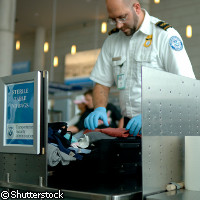Czech scientists target safe transport with substance detector
A Czech design company and producer of earth science and environmental instrumentation has announced it is developing a new detector that may help relax security regulations at airports, in particular those targeting the transportation of liquids, Ceská hlava's Science and Media Newsletter reported. The new detector's capacity to identify dangerous substances within one second is bound to make travellers breathe a huge sigh of relief. Dr Jirí Bláha, Director of RS Dynamics, which is leading the project, was quoted as saying, 'The pressure of the travel industry to relax security measures made us think about ways to enable passengers to carry liquids in their hand luggage. That is why we are developing a detector.' Dr Bláha predicted that the detector will be ready within three years. According to him, the system is unique in that it will be able to detect the substance in question without having to open the bottle and collect a sample. Dr Bláha also pointed out that the detector will be equipped with a 'reading bed', where reading aerials will be located. Each bottle will be placed into the reading bed and linked to an evaluating unit. It will be taken out once it is measured, he added. 'We are currently working on making the machine very exact,' Dr Bláha explained. 'The trouble lies with the different shapes of glass and plastic bottles.' The team of experts is also seeking ways to specify the range of identifiable substances. Liquids that will still not be allowed on board include peroxide and nail polish remover, as they can be used to produce explosives. 'Worldwide tourist industry pressure towards loosening the stringent airport security makes us think about how to guarantee air-transport security while granting passengers the possibility of carrying certain types of liquids in their cabin luggage,' Dr Bláha was quoted as saying. 'The strict rules now applied at many international airports have their justification. This is because there is, as yet, no reliable method of detecting in good time the presence of a dangerous liquid substance such as an explosive.' While a number of similar detection systems exist worldwide, each one works on different principles, Dr Bláha said. Where these systems fail to pass muster is in their inaccuracy because of the different bottle shapes containing the measured liquids and various innocuous substances. Knowing how to apply a similar method to testing tinned liquids is another challenge that has yet to be dealt with, the project leader remarked. Meanwhile, the Prague Monitor reported that RS Dynamics has already worked on security measures with the Prague airport, which supports the new detection system. 'We will welcome it, but it will not be [adopted] straightaway,' Prague airport spokesperson Eva Krejcí said. 'First, it will be necessary for the European Union to endorse the relaxation of security checks and the use of the substance detector. Then the detectors need to pass necessary certification. It will take a number of years.' Tough security measures and the ban on liquids on board were introduced more than two years ago at all EU airports. Travellers cannot take containers of liquids or gels greater than 100ml on board; nor can they carry water bottles or bottles with other liquids in them. The only goods allowed are liquids and other items purchased after passengers go through their security checks. The EU is mulling over plans to relax the stringent rules from 2010. Sources have been quoted as saying that systems like the one being developed by the Czech researchers should help the plan come to fruition.
Countries
Czechia



